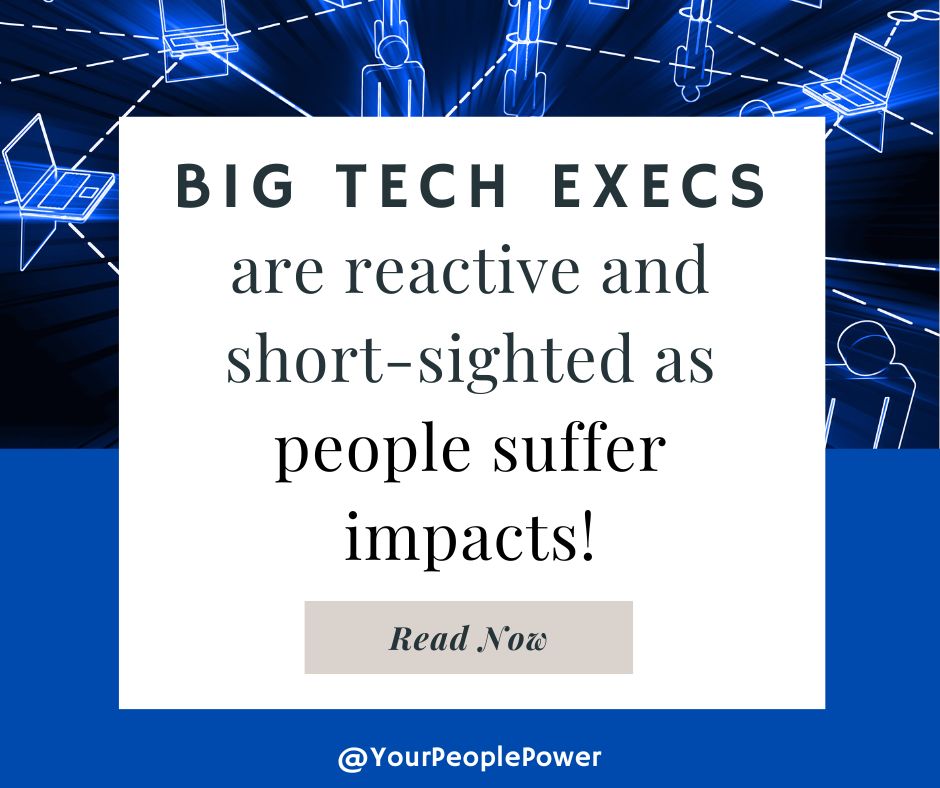BIG TECH are reactive and short-sighted as people suffer impacts!

Over the last two weeks, Big Tech firms like Twitter, Meta, Coinbase, Stripe, Lyft, and Amazon have laid off many employees. Across the industry worldwide, more than 120,000 jobs have been lost, according to the Layoffs.fyi website, which tracks tech job cuts.
What are the reasons for the Big Tech layoffs?
There are many reasons, each firm citing its own, but with common underlying issues. Firstly, the current cost of living crisis has impacted consumer behaviour, reducing demand due to a lack of disposable income.
Amazon attributed its job cuts to an “unusual and uncertain macroeconomic environment”, forcing it to prioritise what matters most to customers. Reports explain the cuts are from the devices, corporate, and HR divisions, with Alexa high on the cut list, due to underperformance. The Business Insider describes the axe as ‘Alexa is on life support’.
At Twitter, Elon Musk is under pressure to make his investment worthwhile.
According to US media reports on Tuesday, Mr Musk told staff they needed to commit to a “hardcore” culture of “long hours at high intensity” or leave.
During times when stress and uncertainty are rising, is adding more stress through fear tactics the right way to go about things? Will that motivate talent or drive them away? How many top-tier employees, who understand their value, were among the 1200 that walked out taking a plethora of knowledge with them? Is this a valuable lesson to fellow CEOs?
Why are there so many layoffs in Big Tech?
Again, there are different reasons, performance, and economic pressures. Still, during the pandemic, as our lives moved to home working, the zoom boom, and more entertainment online, business rocketed for the Big Tech Giants, and mass recruitment occurred for some.
Meta, for example, increased their workforce by 15,000 in the first nine months of this year. But, after plunging billions into CEO Mark Zuckerberg’s Metaverse vision with little to show for it, Meta has been faced with rising costs and shrinking profits. As a result, the company, once worth more than $1 trillion, is now valued at £256 billion, dropping 70% value this year.
Exec’s announcing cuts realise they miscalculated. Chief executive Mark Zuckerberg told Meta employees, as he laid off 13% of them, “I made the decision to significantly increase our investments…..Unfortunately, this did not play out the way I expected.”
According to Reuters, Zuckerberg said in a message to employees. ‘I got this wrong, and I take responsibility for that.’
Why are Big Tech execs making poor decisions with catastrophic effects on people?
Could pressure and competition be playing a part? Dare I suggest ego? The race to be the wealthiest person on the planet and maintain the top spot might have resulted in some execs jumping into the next new thing, going in with an ‘all in’ gamble mindset. Where was the analysis? The caution? The consideration for the people who now feel disposable, undervalued, and used?
It was only natural that people would start stepping out from behind their computer screens and gaming consoles post-pandemic. To physically go into stores again, purchase, and try on goods to see them in their physical form before buying; to get out from behind the applications and seek genuine human connection.
What I describe is apparent human behaviour, and it begs the question, are the Big Tech’s Exec so close to the tech, and AI, that they have fallen out of touch with what it means to be human?
Could a lack of focus be at play? In the new normal we live in, with change as the only constant and an age of information overload and pressure to deliver, are execs getting the headspace to think through decisions or just following their guts? Or, even worse, just following suit of their competitors one by one, we see them mirroring behaviour except for one, Apple, who chooses to be less reactive and instead treading cautiously. Yet to lay anyone off and put a hiring freeze in place, with exceptions for in-demand roles.
So, what’s the long-term (apparently unseen) impact for these CEO’s?
Simply put, people will not want to work for these Big Tech’s. People have feelings and emotions, unlike the tech they are building; we should all do well to remember and hold onto that. Top talent chooses to be valued because they value themselves. People remember how situations made them feel, and once the job markets open up again for these companies, it will be human nature for prospective candidates to think about whether that company embodies the right fit and culture for them.
Finally, where is the emotional intelligence of the leaders at the top? I don’t see it, and that’s a huge problem.
Written by the Editor at Your People Power.
Recent Posts
- Corporations Fit For The Future: Three Women. One Mission. 5 July 2025
- KPMG’s Wellbeing Blueprint: 🌍 YPP Spotlight 30 June 2025
- Microsoft’s Culture Of Inclusive Allyship Leads The Way: 🌍 YPP Spotlight 24 June 2025
- How remote-first tech powerhouse, Atlassian, strives to build a Global Culture of Care, one Wellness Day at a time 16 June 2025
- From Toxic to Thriving: The Business Case for Kindness in the Workplace 9 June 2025
Loving the information on this website , you have done great job on the posts.